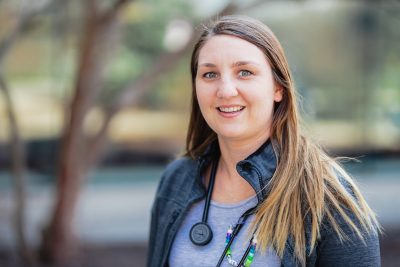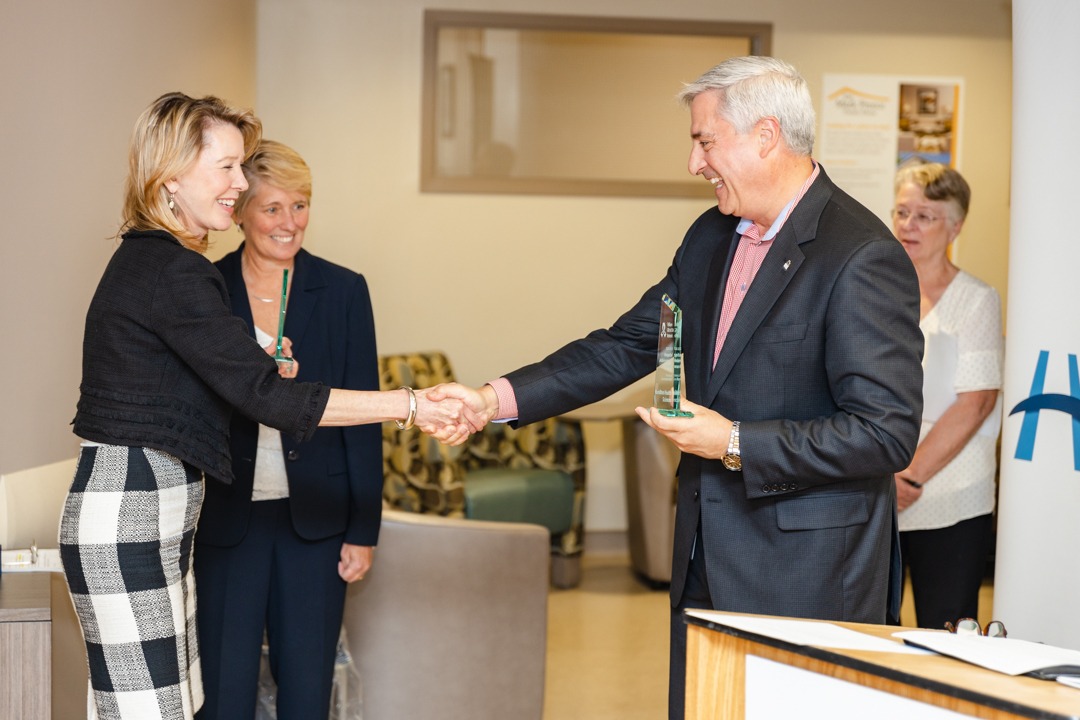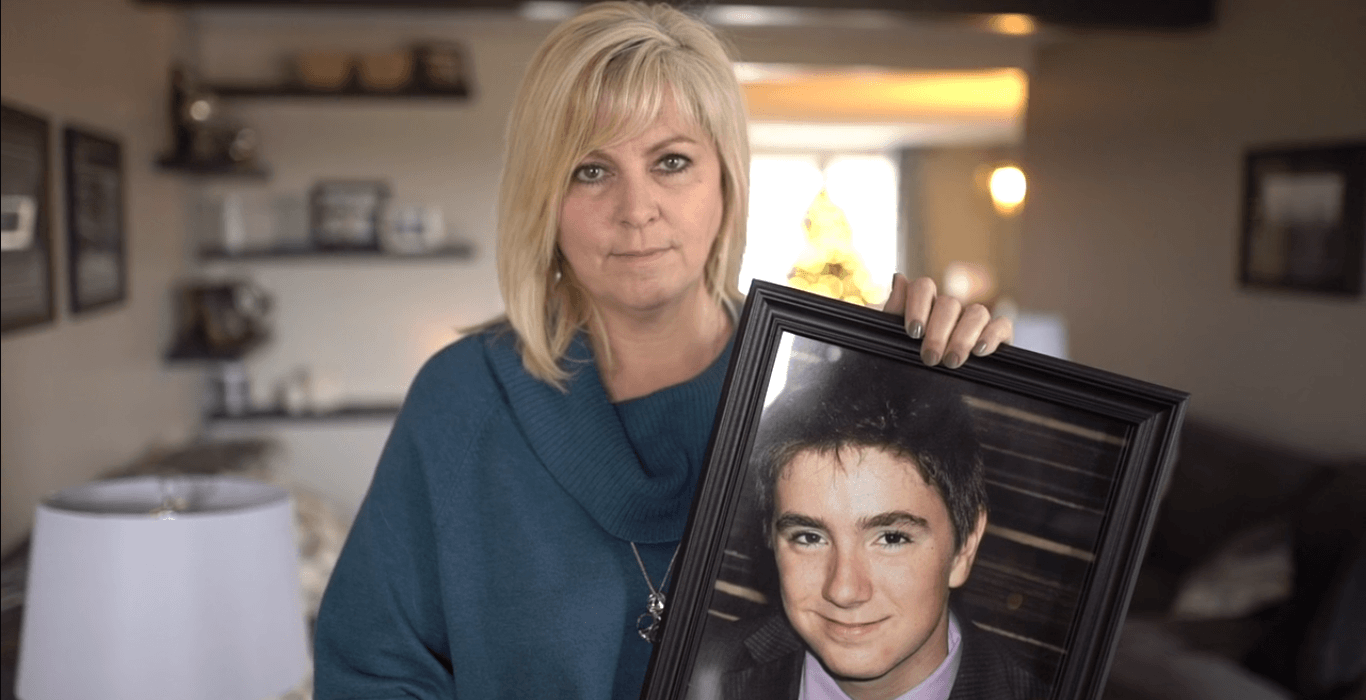
Celebrating Hidden Heroes during Be A Donor Month
In 2019/2020, Hamilton Health Sciences (HHS) provided care to many patients whose donations of organs at our hospitals led to 180 transplants.
The success of organ donation in Ontario not only relies on the efforts of many people who embrace organ donation as a social responsibility, but also on dedicated hospital teams, like those at HHS who work collaboratively to make sure organs are available when needed.
During Be A Donor Month, we are reminded of the commitment of many people across HHS whose efforts support organ transplantation, and ultimately enhance the lives of many. These hidden heroes have continued their work despite the pandemic’s unprecedented challenges. We recently had an opportunity to speak with a few of them.

Claire Gosselin, Chaplain
What inspired you to become involved in organ donation work?
I support families in all phases of their hospital journey, including the organ donation choices families and individuals make. In working with dedicated staff who support this journey, I see firsthand their compassion, selflessness, and dedication, and that inspires me to be part of the team. I have also witnessed how giving others an opportunity at a better life through organ donation may support families in their grief, and offers something redeeming in the midst of their loss.
How has COVID affected your work?
COVID has limited how we support families who are in the intensive care unit (ICU), especially those who have agreed to organ donation, because they are less present at the bedside than in pre-pandemic times. I grieve those limitations, and I try to be more intentional in connecting with families and staff to provide support. I use technology or the phone to assist me in supporting families.
What do you find most rewarding about the work you do?
I am privileged to work with courageous people who are willing to consider others by choosing organ donation, while they are themselves grieving tragic losses. This moves me.
What message do you hope Be A Donor Month sends to the community?
Organ donation is caring for others; you will not be alone on this journey.

Michelle Bisaillon, Social Worker
What inspired you to become involved in organ donation work?
I have always believed in the importance of organ donation, but recently I know of someone who was an organ recipient. She had a number of years added to her life from this donation. She now has the opportunity to grow and live a fulfilled life. Additionally, the family that gave the organ has the knowledge that their loved one’s legacy lives on in others. Hopefully this brings them comfort and peace.
How has COVID affected your work?
Due to COVID restrictions, stressed families have an increased need for social work intervention. Beyond this, families also often experience a different form of grief with a COVID loss compared to other types of loss, especially if they have survived the virus and their loved one has not. Our patients are allowed limited in-person visitors due to COVID restrictions. This is affecting both the emotional and physical well-being of the patient and their families. Nothing compares to the presence and touch of a loved one during an illness. So, we are using creative ways to connect families such as video chats, recorded video messages and phone calls.
What do you find most rewarding about the work you do?
Our team supports ICU patients and their families during one of the most difficult times of their life. We facilitate the process of navigating the healthcare system and advocating for the patient, and provide counselling, help filling out insurance forms, legacy work at the end of life, and just being present with a family who has made the decision to donate their loved one’s organs. I find it most rewarding to accompany patients and their families through all or part of their journey in ICU. Often, when a patient is admitted to ICU, there is a lot of uncertainty about the outcome, but being there as a support in whatever form they need is the most important part of this job.
What message do you hope Be A Donor Month sends to the community?
My hope is that Be A Donor Month brings awareness and provides education on the importance of organ donation. The impact that organ donation can have for individuals waiting for transplants, and the families of loved ones who are able to donate is life changing. My colleagues and I encourage families to have discussions with their children, and make their wishes known for end of life if they want to donate their organs or their tissues. For people who are interested, please sign up.

Laura Smith, Registered Nurse, Intensive Care Unit
What inspired you to become involved in organ donation work?
Years ago I became involved with organ donation as a part-time on-call coordinator while working in the ICU. These families need so much support, as understanding brain death is complicated. They see their loved one on a ventilator and it is hard to comprehend that they are no longer with us. The ICU team does an exemplary job supporting families whether it is in hospital or virtually now with the pandemic. I am beyond grateful to be part of this team.
How has COVID affected your work?
COVID has changed everything. Visiting is limited; families at times are saying goodbye virtually, which is heartbreaking. Multiple policies and processes have changed however, that have not impacted how we care for the patient or the amount of donations we see. The staff are tired, and at times we feel overwhelmed, but we have tremendous support from each other, and that goes a long way.
What do you find most rewarding about the work you do?
It is satisfying to know that when you help someone through a time of grief and uncertainty, you have made a difference in their life long after they leave the hospital. Dying with dignity is what we strive for with all of our patients, and I am proud of the work we do in collaboration with our End of Life working group.
What message do you hope Be A Donor Month sends to the community?
I would like to see the community look to organ donation not as an “option,” but rather an “opportunity” to save someone else’s life, and turn a tragedy into a possibility. Multiple lives can be saved and countless others can be enhanced all through one donation. You would want it for yourself, so consider giving it for another.

Alissa DeJong, Registered Nurse, Pediatric Intensive Care Unit
How has COVID affected your work?
The pandemic has brought us a greater sense of teamwork: from supporting each other with ever-changing policies and procedures, supporting other areas of the hospital, and checking in on each other with changes outside the hospital walls. It has also brought an immense awareness of mental health and our role in supporting our patients and families, and our colleagues, through a time of uncertainty.
What inspired you to become involved in organ donation work?
As a nursing student, I had a placement on a pediatric organ transplant unit. I have seen firsthand how an organ donation has saved the lives of many children or increased their quality of life. I’ve been able to deliver news to a family that a potential match has been found, but I’ve also seen children wait years for a match and know of children who have died waiting. Working in the Pediatric Critical Care unit has brought many joys watching children recover from illness, trauma, and surgeries, but I’ve also witnessed the immense pain of families whose child will never recover. What inspires me to be involved in organ donation is twofold: watching children who have received a transplant grow and thrive, but also seeing the strength of families and communities who choose to donate their loved ones’ organs with the hope that it will change the future for someone else.
What do you find most rewarding about the work you do?
What I love most about working in the pediatric intensive care unit (PICU) is witnessing the unique strengths of children and families that come into our care and the opportunity to help support them in their journey.
What message do you hope Be A Donor Month sends to the community?
I hope Be A Donor Month opens the door for an awareness of the purpose of organ donation, the different types of organ donation and the need for organ and tissue donors. I also hope it provides a gateway for people to be open with their loved ones and talk about their wishes for their future.
Be A Donor Month occurs every April in Ontario. Learn more about organ donation here.



